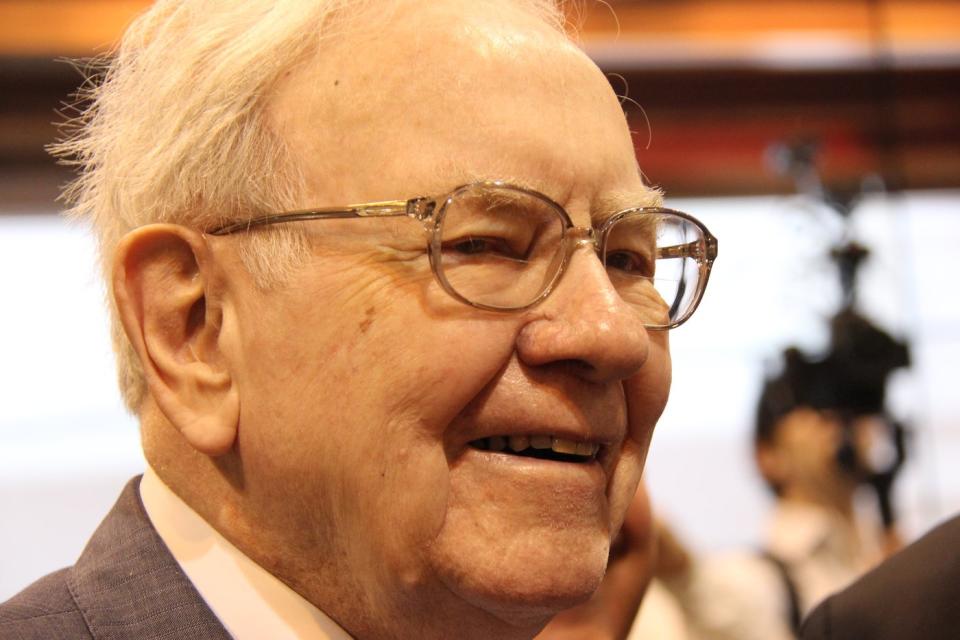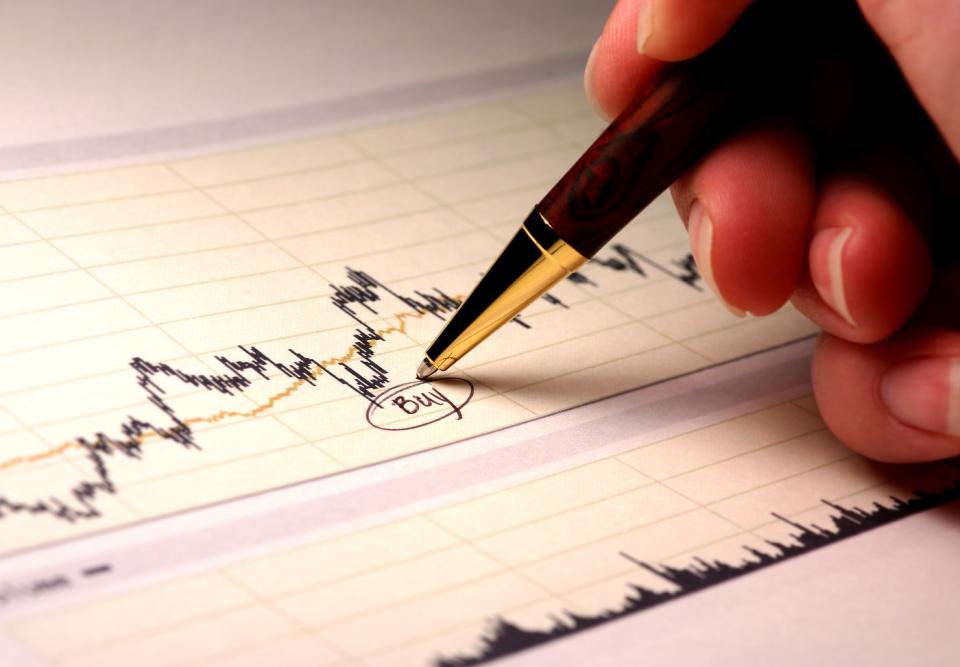Warren Buffett’s Latest $345 Million Buy Brings His Total Investment in This Stock to Almost $78 Billion in 6 Years
For nearly six decades, Berkshire Hathaway (NYSE: BRK.A)(NYSE: BRK.B) CEO Warren Buffett has been dazzling Wall Street with his investing prowess.
Since taking over the role as Berkshire’s chief in the mid-1960s, the aptly named “Oracle of Omaha” has overseen a cumulative return in his company’s Class A shares (BRK.A) of greater than 5,180,000%, and has practically doubled up the average annual total return, including dividends, of the benchmark S&P 500. When you consistently crush the most widely followed index in the return column, you’re going to draw an audience.


Buffett’s phenomenal investment returns are what lure in the neighborhood of 40,000 people annually to Berkshire’s annual shareholder meeting in Omaha, Nebraska. It’s also what causes investors to wait on pins and needles for the release of the company’s Form 13F. A 13F is a document filed on a quarterly basis with the Securities and Exchange Commission (SEC) that shows investors which stocks Wall Street’s brightest minds have been buying and selling.
But the biggest surprise isn’t always what’s in Berkshire Hathaway’s 13F. Rather, it’s the buying activity for Warren Buffett’s favorite stock, which won’t be found in a 13F filed with the SEC.
Buffett has been a net-seller of equities for seven consecutive quarters
Even though Berkshire has yet to file its 13F for the second quarter — it’ll be filed with the SEC following the close of trading on August 14 — the company’s second-quarter cash flow statement points to a similar trend we’ve witnessed since the start of October 2022. Namely, Buffett and his top investment aides, Ted Weschler and Todd Combs, have been persistent net-sellers of equities.
The fair value estimate for Berkshire’s position in Apple, as of the end of the second quarter, points to a nearly 50% reduction in Berkshire’s stake in the tech giant. Further, Buffett and his crew sold shares of Bank of America, Berkshire’s second-biggest holding by market value, for 12 consecutive trading sessions (July 17 – August 1), as of this writing.
Altogether, Buffett and Co. have been net-sellers of equities for seven consecutive quarters, with approximately $131.6 billion more in securities sold than purchased. This has ballooned Berkshire’s cash pile to an all-time record $277 billion.
To be fair, Buffett and his team have done some buying — it’s just been very selective.
For instance, 13Fs and Form 4 filings with the SEC show that the Oracle of Omaha has been adding with some degree of regularity to oil and gas stock Occidental Petroleum (NYSE: OXY) since the start of 2022. In a span of roughly 30 months, Berkshire’s brightest investment minds gobbled up more than 255.2 million shares of Occidental.
Considering the minimal role energy stocks have played in Berkshire’s investment portfolio this century, having close to $15 billion tied up in Occidental Petroleum signals that Buffett and his crew expect the spot price of crude oil to move higher; or at the very least remain above its historic average.
The biggest catalyst for Occidental Petroleum looks to be tight global crude oil supply. Approximately three years of reduced capital expenditures during the COVID-19 pandemic have created a scenario where global energy companies are unable to quickly increase production. As long as the supply of crude oil is constrained, its spot price should receive a boost.
This is particularly important for Occidental, which generates an outsized percentage of its revenue from its upstream drilling segment. Despite being an integrated operator that also owns chemical plants, its operating cash flow is highly dependent on swings in the spot price of crude oil.


The Oracle of Omaha has purchased almost $78 billion worth of his favorite stock
However, adding more than 255 million shares of Occidental Petroleum common stock is mere peanuts compared to what Warren Buffett has put to work in his favorite stock over the last six years.
As I alluded earlier, not all of Berkshire’s buying and selling activity is going to be found in a 13F. For details on the Oracle of Omaha’s favorite stock to buy, you’ll need to dig into Berkshire Hathaway’s quarterly operating results. Just prior to the executive certifications of every quarterly report from Berkshire, you’ll find a detailed page describing the share repurchasing activity undertaken during the quarter. You guessed it… Warren Buffett’s favorite stock to buy is none other than shares of his own company!
To be clear, buying back stock wasn’t always easy for the Oracle of Omaha or his late, great right-hand man, Charlie Munger.
Prior to mid-July 2018, share buybacks were only allowed if Berkshire Hathaway’s share price fell to or below 120% of its book value, as of the most recent quarter. At no point in the many years leading up to mid-July 2018 did Buffett company’s fall to or below this threshold, which meant no buybacks were undertaken.
Everything officially changed on July 17, 2018. On this date, Berkshire’s board reworked the criteria governing share repurchases to allow Buffett and Munger to come off the proverbial bench and swing for the fences.
According to this updated policy, buybacks can commence with no end date or dollar ceiling as long as:
-
There’s at least $30 billion in cash, cash equivalents, and U.S. Treasuries on the company’s balance sheet; and
-
Buffett believes that Berkshire’s stock is intrinsically cheap.
While the last point is a bit subjective, it hasn’t stopped Warren Buffett from repurchasing shares of his company for 24 consecutive quarters.
During the June-ended quarter, Buffett oversaw the retirement of 555 Class A shares (BRK.A) totaling $345,137,002! On an aggregate basis, this works out to nearly $78 billion worth of buybacks since this program was amended on July 17, 2018. This is more than double the amount of cash Buffett and his team spent buying shares of top holding Apple!
Since Berkshire doesn’t pay a dividend, share repurchases are an easy way to reward investors. Continually retiring shares via buyback is incrementally increasing the ownership stakes of long-term shareholders. You could say it’s the perfect tool to instill the long-term ethos in investors that Buffett and Charlie Munger have appreciated so much.
Furthermore, buying back stock and reducing the outstanding share count can increase earnings per share (EPS) for companies with steady or growing net income (sans unrealized investment gains/losses). This should help make Berkshire even more attractive on a fundamental basis.
With $277 billion in cash in the coffers and little in the way of value piquing Warren Buffett’s interest, it’s a veritable certainty that the (re)purchase of Buffett’s favorite stock will continue.
Should you invest $1,000 in Berkshire Hathaway right now?
Before you buy stock in Berkshire Hathaway, consider this:
The Motley Fool Stock Advisor analyst team just identified what they believe are the 10 best stocks for investors to buy now… and Berkshire Hathaway wasn’t one of them. The 10 stocks that made the cut could produce monster returns in the coming years.
Consider when Nvidia made this list on April 15, 2005… if you invested $1,000 at the time of our recommendation, you’d have $606,079!*
Stock Advisor provides investors with an easy-to-follow blueprint for success, including guidance on building a portfolio, regular updates from analysts, and two new stock picks each month. The Stock Advisor service has more than quadrupled the return of S&P 500 since 2002*.
*Stock Advisor returns as of August 6, 2024
Bank of America is an advertising partner of The Ascent, a Motley Fool company. Sean Williams has positions in Bank of America. The Motley Fool has positions in and recommends Apple, Bank of America, and Berkshire Hathaway. The Motley Fool recommends Occidental Petroleum. The Motley Fool has a disclosure policy.
Warren Buffett’s Latest $345 Million Buy Brings His Total Investment in This Stock to Almost $78 Billion in 6 Years was originally published by The Motley Fool





